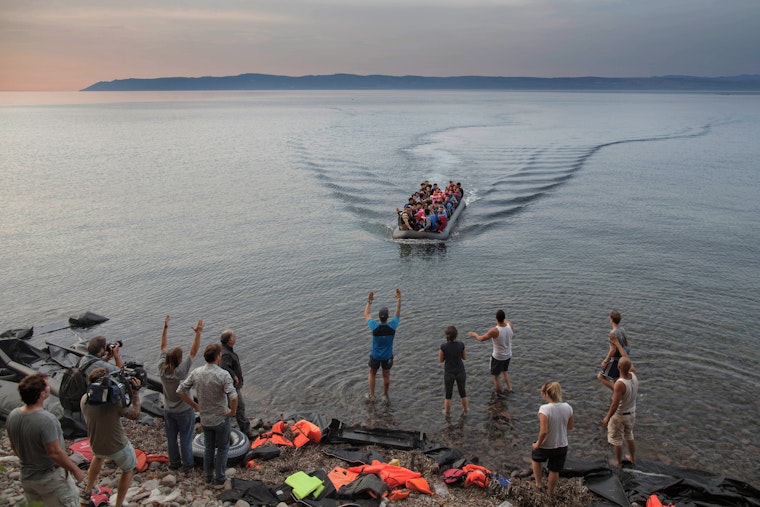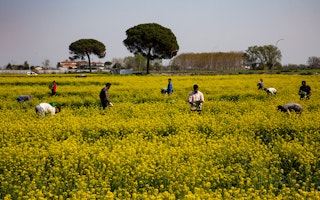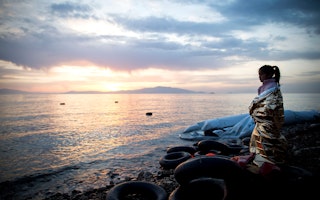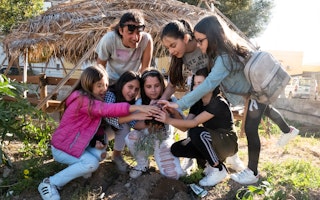An Effort to Assist Refugees Arriving on Greece’s Islands
By Epaminondas Farmakis

As I have visited the Greek islands of Lesbos, Kos, Leros, Rhodes, Tilos, and Samos amid the current influx of refugees, I have felt both pride and dismay.
I’ve felt proud of the civil society groups and ordinary citizens who are working tirelessly to respond to the unprecedented needs of these vulnerable populations. And I’ve felt frustrated as I’ve watched people with a right to international protection resort to smugglers to enter Greece and continue their journey onward through Europe.
Islands like Lesbos are prime entry points into Europe. While other Greek islands, like Kos and Chios, are also close to Turkey, Lesbos is a mere six miles from it, and its seas are relatively calm. Nearby Turkish shores are sparsely inhabited, making them ideal spots for smugglers to gather refugees into flimsy inflatable rafts.
Today the situation on Lesbos and other islands remains challenging. In August, a surge in arrivals and slow registration processes led to a backup of more than 20,000 refugees on the island, nearly a quarter of its native population. The refugees protested the inhumane lack of services they found there, blocking traffic and clashing with the police.
Though the scale of daily refugee arrivals has decreased since then—from around 3,000 during the summer to 1,000 in October—reception conditions remain abysmal. In September, the streets of Lesbos and Kos in particular were still full of refugees speaking a variety of languages, lugging large backpacks, and charging their phones in cafes for outrageous fees. There were long lines outside ferry company offices where people were waiting for tickets to Athens.
In the absence of a proper transportation service, people who reach the Greek shore must walk 25 miles to the nearest small registration center. Humanitarian organizations struggle to offer meaningful services beyond initial reception points. The first autumn rains have started, and without basic infrastructure the situation will only get worse.
All stakeholders—local and regional government, local volunteer groups, Greek and international NGOs, and state services—need to step up relief while a political solution to the problem takes effect.
In an effort to respond to immediate needs, Solidarity Now has joined forces with Greek civil society organizations that have been active on the ground from day one. For instance, we support Greek NGO METAction, the only providers of interpreter services on the islands, who have been instrumental in helping register asylum applications. METAction is also present at the northern border of Greece, in Idomeni, providing humanitarian aid. Plans are afoot to establish a mobile unit at the border crossing to provide medical care and basic support.
Already, we support two mobile units on the smaller islands of Kos and Leros, south of Lesbos. Given that there is no existing infrastructure on the islands to deal with this flow, the National Asylum Service and the First Reception Service—the Greek state agency for third-country nationals who cross borders—called for our support in this area.
We have also partnered with organizations like Greek NGO PRAKSIS, Doctors of the World–Greece, and other civil groups on smaller islands like Tilos, where we are working to respond to immediate needs of shelter, medical care, transportation, and psychosocial support.
The situation in the cities of Athens and Thessaloniki—where refugees are transferred—is also challenging. Solidarity Now operates two Solidarity Centers in each city to address the lack of access to a comprehensive package of services for the most vulnerable populations. There we offer space to new and existing civil society organizations, while a branch of the state asylum service operates within the Athens center to fast-track asylum procedures.
Shelter remains limited, and lately we have seen people gathering in central squares as they wait for a way to move north and cross through the Balkans. This is why we have joined forces with the Municipality of Thessaloniki and other NGOs in an attempt to offer, through a coherent program, temporary shelter and support to people on the move.
Still, our advocacy has to grow stronger. As right-wing political groups like Golden Dawn dramatically consolidate support on islands like Lesbos, we must call for refugees to be treated as human beings needing protection, rather than threats to our security. Europe should not be separated by borders but united by humanity.
Solidarity Now was established with the support of the Open Society Foundations.
Epaminondas Farmakis is the managing director of Solidarity Now.


